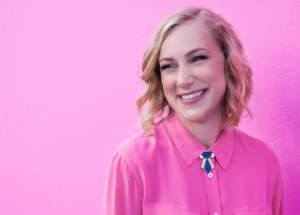
Over the past half decade, Kati Morton, LMFT has used social media to discuss mental health-related subjects with viewers from throughout the world. Eating issues and self-harm are often the primary focus, but her conversations cover a wide range of mental health topics.
Kati received her master’s in clinical psychology from Pepperdine University. She is also a certified dialectical and behavioral therapist and grief counselor, member of the California Association of Marriage and Family Therapists, and continuing education presenter at GoodTherapy.org. In her upcoming web conference, Self-Injury: Assessment, Comorbidity, and Treatment, Kati will discuss the stigma surrounding mental health and self-harm.
On YouTube, Kati is known for her channel, which has over 220,000 subscribers. Kati has also gained followers on Twitter, Facebook, and her website. She has been featured in Glamour UK and appeared on the HLN/CNN show Dr. Drew On Call. In addition, Kati was a Shorty Award finalist in 2016 and nominated for the 2016 Streamy Awards.
By bringing awareness to mental health issues, Kati hopes to separate stigma from seeking therapy and promote better mental health services worldwide. In an exclusive interview with GoodTherapy.org, Kati discusses her global online community and shares her thoughts on how to make mental health more relatable and accessible.
What led you to start your YouTube channel, and can you describe how that process went for you?
It was actually my husband who wanted to start it. Because he does film production for a living, he’d gone to a conference in a convention where he was filming, and they talked about YouTube, and he was obviously listening as he was filming. He came home and was like, “You always talk about how people don’t understand what you do—we should tell people on YouTube. I’ll help you film, let’s put it out there.” And I was like, “No, I don’t want to be on camera.” Then a few months later I was like, “Okay, let’s just give it a try with a couple of videos.” And that’s how it started.
What inspired you to center some of your discussion on the topics of eating issues and self-harm?
It’s what I know best, you know? My first internship was with an eating disorder treatment center, inpatient, and it wasn’t something I thought I would want to work in. I had some close friends in high school go through eating disorder struggles. But I found it to be so rewarding, and for people who don’t know, there’s a huge comorbidity between eating disorders and self-injury. A lot of times, people will swap one out for the other or struggle with both simultaneously. I just started because it was one of the jobs I got, and it’s tough work but so worth it.
How did your experiences in inpatient and outpatient treatment facilities influence your life and career path?
Career path-wise, that’s what I specialize in. I decided to continue working in that realm. I think as a whole, if you decide to specialize, it changes the trajectory of your career in many ways. I think working in an inpatient ward, hospitals, as well as actual treatment centers really made me want to continue. And seeing when people are at their lowest point, that’s the highest level of care, and knowing it can get better from there gave me hope to do it on an outpatient basis. I worked at IOPs [intensive outpatient programs] and PHPs [partial hospitalization programs] as well, and seeing people work through it gave me hope for not only myself but for others. And it’s always kept me going.
How has your approach to creating content evolved as your online and social media presence continues growing?
There’s a couple of main things. Obviously, not everybody’s comfortable on camera. So the first videos are super awkward and uncomfortable, and you can definitely see, as I get more used to being in front of the camera, more personality, versus me being very clinical and dry and awkward. Also, I’m more casual in general. I found as the channel grew, people had more questions about what therapists think, which I always find to be interesting. I’m in therapy myself, and there are some times when I’m like, “I wonder if she just thinks I’m totally crazy, that I think that or I wonder about that.” Because it’s the human condition. We seek connectivity and understanding, and it goes both ways.
And also, something I’ve shifted over the years is I’m not able to answer every question or comment. But when I started, I was able to do it. I think it was after the first year I remember telling my husband, “I can’t do this. I’m totally burnt.” I think it’s finding what works and how it’s sustainable for me. And content creation has shifted as to what people ask for, because it’s all community-based.
How have your successes affected your private practice? Do the people you see in therapy react to your status as a public figure?
I’ve only had it a couple of times. I’m very leery of taking any viewers on as patients. So right now, I only take new patients in from my referral sources, like a psychiatrist I’ve worked through for years and other clinics that I already know. I did have [one] client. He had taken a break, and I already had my channel but it was only a year or two old, so when he came back for a few months, he was like, “Congratulations, you’re famous and stuff!” And I said, “Oh, does that bother you?” or “What are your thoughts on that?” And he was like, “No, that’s awesome, that’s cool! It’s a great resource. I watched your video about GAD [generalized anxiety] and I found it super helpful.” And I was like, “Oh, okay, cool.” And that’s about it. I do utilize it sometimes, especially for psychoeducation. If they have a new diagnosis and we’ve talked about it, I’ll say, “You can watch this video if you want to know more.”
What role do you want your content and videos to play in reducing the stigma surrounding mental health issues and seeking therapy?
I do get some pushback from the therapy world, from other therapists who are like, “You should take this more seriously.” And no offense to them, but I think that’s the old way of thinking. I think being a therapist and making it more approachable only does good. Just like anybody, I’m not going to be the person everybody likes, and that’s fine. So my main goal is to make it accessible so it’s not so scary. I think the stigma lingers because of fear, as well as ignorance. So by educating and making it more relatable and approachable, hopefully [like] I told my husband, “If even one person decides to get help because of this, it’s all worth it.”
I always encourage my audience to share in the comments, because that also empowers people to reach out and reminds people we’re all suffering from the human condition. We all have issues from time to time, and that’s not a bad thing.
How do you think the prevalence of the internet has impacted our ability to understand and process our own mental health and mental health issues?
It’s got positives and negatives, like anything. I think when it comes to the online world, the anonymity there is really powerful for people. People are able to talk about things they might not be able to face to face online because it’s a little safer. If I’m Trixiegirl57, I can tell you that I struggled with suicidal thoughts when I was a teen and not feel vulnerable [as] me telling you face to face.
I also think the ability to disseminate information is really powerful. Even in the video content I create, I always encourage my audience to share in the comments, because that also empowers people to reach out and reminds people we’re all suffering from the human condition. We all have issues from time to time, and that’s not a bad thing. So overall, the internet and online resources have only made things more accessible.
Some use the internet to express volatility and negativity. How do you maintain the online community you’ve developed as a safe place for healing and growth?
It’s the way I communicate it to them. I don’t know when I freed myself from approving all comments. I used to [have] long lists of words that aren’t approved. I’ve always approved everything, and because I did that, it kept [the words] out and I would let them know that’s why. I was like, “Don’t think this happened by accident, I put a lot of effort into this and you should too.” And so part of it is, instead of it being just me, it’s a whole community. When I decided to let that go, I asked people in the community, “Who wants to be moderators?” And people automatically signed up. It’s like co-ownership over the community. Because overall, everyone is going to want it to be a safe and nice place. If you give them the option and you empower them, they’ll do a good job.
Mental Health America’s State of Mental Health Report 2018 was recently released. It included data indicating that rates of severe youth depression have increased over a five-year period and that 1.5 million youth experiencing major depression did not receive any mental health treatment. As a society, what can we do to combat these trends?
Talk about it. I speak at schools, and I’ve been trying to get someone to help me with it. So I heard back from an agency, and they said, “You know there’s no money in mental health, people don’t really want to hear about it.” And I mean, thanks for your candor. But I think that’s a problem.
The more we talk about it and tell children and people of any age that it’s normal to have a hard time and to have these ebbs and flows, this is when you need to talk to someone. That’s just basic knowledge people should have and we don’t teach that in schools. We don’t talk to kids about mental health. I feel like there are certain things we should teach kids, and the more we talk about it, the less we’ll see those numbers because they’re more apt to talk to someone or reach out if they know it’s okay and that there are resources. I get a ton of comments asking, “How do I know if I have a school counselor?” I’m like, “How do you not know? Somebody should have told you!”
I think that some of that is on us as adults, to change the way that we educate and talk about it. Even if you don’t have all the answers, it’s still okay to tell a child or a teenager, “It’s okay to talk about it. I don’t know what necessarily this means, but we can find someone who does. And that’s okay too.” Shutting down or telling them it’s not a big deal is the wrong thing, and a lot of parents don’t know how to handle it. And there’s more pressure on kids. I mean just having social media, can you imagine? Having social media when you’re a teenager? Holy moly.
You have shared that seeking therapy for yourself is an important part of your self-care regimen. How would you describe the importance of therapy to someone who is considering it?
Seeking therapy for myself has been a huge part of taking care of myself, and I honestly believe all therapists should. You need to know what it’s like to be on the other side of it. [With] the therapeutic relationship, it’s almost like the way people describe knowing you want to date or marry someone. It sounds so cliché, but therapy is the same. I always tell people, you need to know you like them enough to tell them some big things at some point. And you feel like they’re on your team and they really hear you. It’s going to be different for everyone. I know it’s not always going to be perfect, and your therapist can push you a little harder than you want sometimes, but that’s part of their job. And trust your gut. Usually, you know right away.
What is your advice for therapists and mental health advocates who aspire to create content but are having difficulty starting out?
It’s a lot of work, I understand. My advice is always the same: just do it. You can hem and haw and try to put together the perfect video, but that doesn’t exist because you don’t know what you’re doing yet. You’re learning. I think people worry, especially in therapy, “What if a potential patient sees it and doesn’t like it?” Well, that means they’re probably not going to be a good fit for you anyway. Just do things that are true to who you are and what you want to represent, and you’re going to be fine. There are always going to be more questions to ask yourself and wonder and worry about. But the sooner you start going after things that you want, the sooner they’re yours.


 New Scientific and Social Media Tools for Preventing Suicide
New Scientific and Social Media Tools for Preventing Suicide Mental Health Matters: Consequences of Mental Health Stigma
Mental Health Matters: Consequences of Mental Health Stigma Mental Health Matters: 8 Stigmatizing Phrases to Stop Using
Mental Health Matters: 8 Stigmatizing Phrases to Stop Using

Please fill out all required fields to submit your message.
Invalid Email Address.
Please confirm that you are human.
Leave a Comment
By commenting you acknowledge acceptance of GoodTherapy.org's Terms and Conditions of Use.